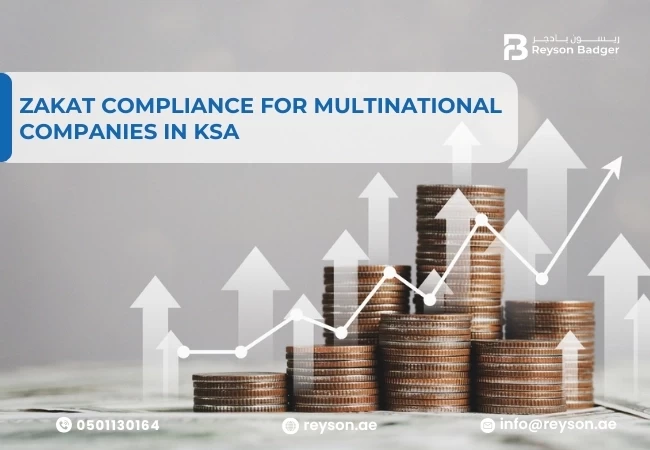Zakat Compliance For Multinational Companies In KSA
Written By Akshaya Ashok, Reviewed By Reyees K P
Published on 28/11/2024

The economic diversification and regulation reform practices initiated by Saudi Arabia have brought Zakat compliance into focus for the businesses operating within the country. For multinational corporations, Zakat compliance is about meeting those legal requirements that foster a sense of transparency and go toward the Kingdom's social objectives and economic objectives. Zakat represents a key financial duty as an essential Islamic charitable obligation, and multinational companies must navigate its requirements with diligence.
This blog provides multinational corporations with practical insights into how to effectively manage Zakat compliance. It looks into the fundamentals of the Zakat base, outlines regulatory requirements, highlights critical factors for accurate Zakat calculation, and shares strategies for ensuring compliance with local laws and Islamic principles.
Zakat Compliance in Saudi Arabia
Zakat compliance in Saudi Arabia is governed by the Saudi Zakat, Tax, and Customs Authority (ZATCA). Multinational companies operating in the Kingdom will be subject to Zakat on income and assets derived from their local operations. On the other hand, the international revenue or assets earned by such companies are not subject to Zakat. Zakat collection and distribution to the needy are essential components of social welfare, which will further the development and welfare of Saudi society.
For multinational companies, compliance with Zakat involves several essential steps to ensure that their operations and financial transactions are in line with ZATCA’s requirements.
Zakat Base for Multinational Companies
Zakat for multinational companies is primarily calculated based on assets that are owned and profits that are generated from their operations in Saudi Arabia. Zakatable assets generally include:
- Money and Liquid Assets: Includes cash holdings, bank accounts, and other highly liquid financial instruments.
- Inventory: Goods or products that are available within Saudi Arabia for selling or distribution.
- Receivables: Amounts due to the company from clients or business associates in Saudi Arabia.
- Investment and Financial Instruments: All investment activities within the country and any instrument generating returns within the Kingdom. Non-Zakatable assets, such as international assets and personal belongings, are usually excluded from the Zakat base since Zakat is calculated on the wealth within Saudi Arabia's jurisdiction.
Zakat Rate and Calculation for Multinationals
In Saudi Arabia, the standard Zakat rate is 2.5%, applied annually on the Zakatable assets of the company. The calculation for multinationals involves several steps:
- Identify Zakatable Assets: Gather a comprehensive list of assets that are Zakatable and ensure they are accurately documented.
- Calculate Net Worth in Saudi Operations: Subtract liabilities from Zakatable assets to determine the company’s net worth within Saudi Arabia.
- Apply the 2.5% Zakat Rate: Multiply the net Zakatable assets by the 2.5% rate to determine the Zakat due.
Example: If a multinational company holds assets worth SAR 30 million and liabilities amounting to SAR 5 million, the Zakat base would be SAR 25 million. The Zakat payable would be SAR 625,000 (25,000,000 x 0.025).
Key Compliance Requirements and ZATCA’s Role
ZATCA plays a central role in overseeing Zakat and tax compliance for all entities operating in Saudi Arabia. The following points highlight the compliance requirements and ZATCA’s involvement:
- Timely Filing: Multinational companies are required to file their Zakat returns within the given timeline to avoid fines. The Zakat, Tax and Customs Authority (ZATCA), however, usually requires such filings yearly as per the Islamic calendar.
- Accurate Documentation: Proper documentation is very essential because ZATCA may audit records to ensure accuracy. This encompasses financial statements, asset valuations, and detailed lists of Zakatable assets.
- Transfer Pricing Regulations: Transfer pricing, which applies to transactions between related entities, is strictly monitored by ZATCA to prevent tax evasion. Multinationals must document inter-company transactions within Saudi operations and submit related documents as per ZATCA’s guidelines.
- Audits and Compliance Checks: ZATCA's regular compliance audits crosscheck the accuracy of Zakat's calculations; and transfer pricing, among other tax-related activities.
Consequences of Non-Compliance
Non-compliance with Zakat regulations in Saudi Arabia can lead to several repercussions, including:
- Fines and Penalties: ZATCA imposes monetary penalties for late or inaccurate Zakat filings.
- Legal Action: Persistent non-compliance or failure to pay Zakat could result in legal action by Saudi authorities.
- Reputational Risk: Failing to adhere to Zakat obligations may harm the company’s reputation, impacting its relationship with local stakeholders and government entities.
Strategies for Zakat Compliance
To navigate Zakat compliance efficiently, multinational companies can consider the following strategies:
- Engage with ZATCA: Regular communication with ZATCA can help resolve any uncertainties about Zakat compliance.
- Use Professional Advisory Services: Consulting with experienced advisory firms like Reyson Badger can provide valuable guidance on Zakat requirements. Such services offer insights into local laws, accurate calculation methods, and ongoing compliance management.
- Adopt Transparent Accounting Practices: Clear and transparent record-keeping is crucial. This includes maintaining accurate financial statements, asset valuations, and transaction records within Saudi Arabia.
- Training of Financial Teams: In-house accounting and finance teams should be trained in Zakat laws so that they appreciate the compliance requirements and perform their Zakat obligations effectively.
How Reyson Badger Can Help?
Reyson Badger offers specialized Zakat advisory services to multinational companies in Saudi Arabia. With a team of experts familiar with Saudi regulations and ZATCA’s guidelines, Reyson Badger can assist in:
- Assessing Zakatable assets and calculating Zakat liability accurately.
- Assisting with the submissions of Zakat declarations to ZATCA.
- Offering compliance solutions that align with local laws and ZATCA requirements.
- Consulting on the appropriate techniques for maintaining records, documentation, and transfer pricing.
Conclusion
For multinational companies operating in Saudi Arabia, complying with Zakat regulations is not just a legal obligation but a significant step toward fulfilling corporate responsibility and contributing to the Kingdom’s social welfare initiatives. By gaining a clear understanding of Zakat calculation methods, staying up-to-date with compliance requirements, and recognizing the implications of non-compliance, multinational businesses can ensure they meet their responsibilities effectively. Partnering with experienced advisors like Reyson Badger can provide the expertise needed to simplify the Zakat compliance process, helping businesses align with Islamic principles, protect their reputation, and secure smooth operations within the Kingdom.

Written By
Akshaya Ashok
Akshaya Ashok is a content writer specializing in creating content focused on accounting and auditing. With over two years of experience, she has developed expertise in crafting professional content for the financial sector.

